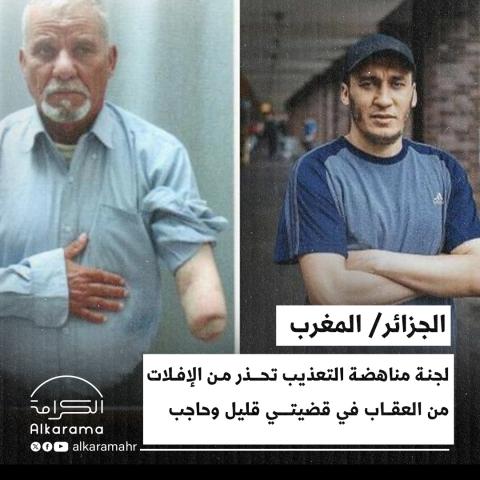
Alkarama brought the cases of Lakhdar Guellil (Algeria) and Mohamed Hajib (Morocco) before the United Nations Committee Against Torture. The Committee officially recognised the two men as victims of torture.
Mr Guellil, a taxi driver from Djelfa, was arrested on 31 July 1996 and subjected to horrific abuse by the Aïn Oussara gendarmerie, including being burned with a blowtorch, which led to the amputation of his left arm. Following an unfair trial, he was convicted in February 1998 and sentenced to 15 years in prison. He was released in March 2006 in a gravely deteriorated state of health. As there were no effective legal remedies available to him in Algeria, Alkarama referred his case to the Committee on 29 January 2016.
Meanwhile, Mohamed Hajib, a German-Moroccan citizen, was arrested in Casablanca on 17 February 2010 upon his return from Pakistan. He was then held incommunicado and tortured for 12 days in an attempt to force him to confess. He was sentenced to ten years in prison (reduced to five on appeal) and served his sentence under conditions marked by ill-treatment. Alkarama submitted his case to the Committee Against Torture on 30 October 2018.
On 19 November 2021, the Committee adopted its decision in the case of Guellil v. Algeria (communication no. 736/2016). Then, on 22 July 2022, the Committee ruled on the case of Hajib v. Morocco (communication no. 928/2019). In both cases, the Committee required the opening of independent investigations, the prosecution of those responsible, and the granting of full reparation.
Yet, as highlighted in the latest follow-up report adopted at its 78th session (30 October – 24 November 2023) and published on 8 August 2024, none of these measures has been implemented in either country. In a letter dated 11 August 2025, the Office of the High Commissioner for Human Rights confirmed the transmission to the Algerian government of Alkarama’s observations, submitted on 9 November 2023, along with the follow-up report for comments.
Inaction fuels impunity
In Algeria, the Committee had requested the repeal of Articles 45 and 46 of the Charter for Peace and National Reconciliation, which enshrine impunity for State agents involved in serious violations. However, no reform has been initiated and no investigation has been opened in the Guellil case, nearly three years after the decision.
In Morocco, despite the official recognition of the acts of torture suffered by Mohamed Hajib, no reparation has been granted to him. Worse still, he continues to face threats and intimidation, which the Committee describes as reprisals for exercising his right to petition the UN. Here again, more than two years after the decision, no measures have been taken by Rabat.
By refusing to implement these decisions, Algeria and Morocco place themselves in a situation of continuous violation of the Convention against Torture and fail in their fundamental obligation to cooperate in good faith with international human rights protection mechanisms.
Faced with this inertia, the Committee has decided to keep international follow-up open for both cases, sending a strong signal: neither impunity nor reprisals can substitute justice and reparation, to which victims of torture are entitled.
